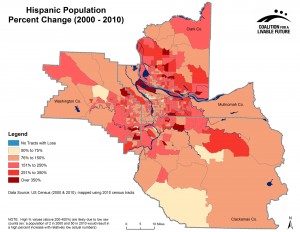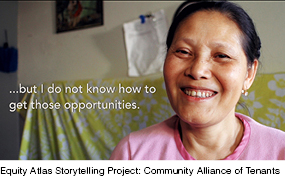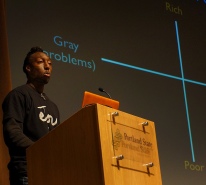2014 CLF Accomplishments
- Regional Equity Atlas 2.0

One Million Views: The Regional Equity Atlas 2.0, CLF’s groundbreaking research and education project promoting widespread opportunity, has been viewed over one million times. This extraordinary milestone underscores that thousands of people are using the Equity Atlas to create more informed decisions, healthier neighborhoods, safer places, and a more equitable region.
A Tool for Change: With help from CLF, organizations and governments across the region are using the Equity Atlas to locate services, target programs, train staff, and make the case for funding critical needs. CLF created maps and analysis for partners around the region including Multnomah County SUN Schools, the Jade District, the effort to increase funding for Safe Routes to Schools, and many others, to help people understand and explain how opportunity is distributed.
A National Model: The Equity Atlas is receiving national acclaim, including from HUD and Living Cities. Our work has also inspired others to build their own Equity Atlases, including several local projects around the country and PolicyLink’s National Equity Atlas.
- Equity Stories Project

CLF’s Equity Stories Project shares the personal narratives of people whose lives are affected by inequities. We worked with a dozen community organizations on the project, which was released in January, and the resulting photos and videos have been exhibited throughout the region.
- Integrating Equity into Government Decision-Making
CLF developed a technique for equity assessments using the Equity Atlas and Multnomah County’s Equity and Empowerment Lens. For example, we led the Portland Bureau of Transportation through an equity assessment of their plan to replace Portland’s street lamps with LED lights, and the assessment helped the agency consider and address inequities before the rollout of the project.
CLF has also taken a leadership role in assisting Metro to develop an agency-wide equity strategy. CLF is collaborating with several community partners to establish equity indicators and measure how well Metro is addressing equity in its programs.
- Equity White Paper Series
Written by issue experts in partnership with CLF, our white paper series provides in-depth analysis on several key topics in the Equity Atlas. You can see these papers on our website or in our newly revived, online Connections journal:
- Suburbanization of Poverty,
by Brendon Haggerty - Middle Class Decline in the Portland Metro Region,
by Christian Kaylor, Oregon Employment Department - Aging and Equity in the Greater Portland Metropolitan Region,
by Alan DeLaTorre and Margaret Neal, Portland State University’s Institute on Aging - Disparities in Access and Opportunity for Persons with Disabilities in Portland,
by Michael Szporluk, Portland Commission on Disability - Improving Healthy Food Access in Rockwood Using Community Voice and Mapping,
by Monica Cuneo with contributions from the Oregon Public Health Institute and Ecumenical Ministries of Oregon
- Regional Livability Summit

CLF’s Summit continues to draw hundreds of increasingly diverse attendees with experience in a wide range of fields. Keynote speaker Dr. Antwi Akom, a renowned social change activist, spoke about the imperative of climate change, and how true climate solutions are linked to addressing the startling conditions faced by people of color. Breakout sessions included discussions of addressing displacement, suburbanization of poverty, aging, affordable housing, police accountability, and empowering local communities to address food issues.
- Collaboration and Advocacy
CLF worked with partners to provide input into plans that have a big impact on the region and the people who live here, including the innovative Climate Smart Communities plan and the region’s first Active Transportation Plan. CLF also convened more than a dozen partner organizations to consider and advocate for equitable strategies to maintain and make the streets safer.
CLF has also shared a weekly digest of events, partnered on educational events, and supported a range of partner-led campaigns, including increasing opportunities to walk and bike to school, funding for affordable housing, lifting the ban on inclusionary zoning, and the Portland Parks bond.
